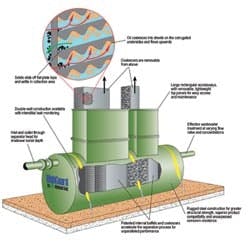Oil/Water Separator Incorporated into Bulk Fuel Storage Facility at Dallas' Addison Airport
Their concept was to build a state-of-the-art refueling facility using the best available above-ground storage and oil/water separator technology. The result is a sweeping, wing-like canopy covering 21 Highland Tank Fireguard above-ground steel storage tanks and an HTC oil/water separator.
EPA compliance
The Washington Group was the lead engineer on the design of the new 330,000-gal above-ground bulk fuel storage facility at the airport. Washington Group engineers approved the Highland oil/water separator for the project to help the facility comply with the U.S. EPA's required NPDES discharge permit and satisfy the SPCC Plan for spill control and secondary containment.
The SPCC Plan for the facility required a quick drainage system for the tank truck and mobile refueler loading or unloading area. oil/water separator was used as part of this drainage system and designed to hold the maximum capacity of any single compartment of the tank truck or refueler loaded or unloaded at the facility.
Treatment of storm water
Highland's HTC-10000 oil/water separator is designed for the treatment of contaminated storm water runoff up to 1,000 gpm, discharging with a certified effluent quality of 10 ppm of free oil and grease.
Highland separators meet the new Underwriters Laboratories UL-SU2215 design, construction and performance standards. Currently, code enforcement officials consider UL-SU2215 certification to be the preeminent national consensus standard for oil/water separator construction and performance.
The vessel was built with double-wall construction with steel secondary containment and equipped with a leak detection system. The tank was fabricated in strict accordance with Highland's HighGuard corrosion control system with a 30-year warranty. The separator was supplied with a high oil level alarm, and it uses manways located above the coalescers, allowing for personnel to safely inspect and maintain the unit from above grade.
The engineers have made every effort to ensure that the new bulk fuel storage facility at Addison Airport will offer no threat to the surrounding community.
